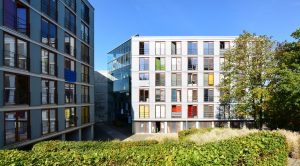 Car-free living refers to a housing offer aimed at households that organise their everyday mobility primarily by bicycle, public transport, on foot or with a car-sharing car and want to use the spaces between the houses for other activities than parking cars standing around on them. It eliminates the cost of building an expensive underground parking garage in urban neighborhoods. It also eliminates the cross-subsidization of car-owning households by car-free households, which in turn saves costs.
Car-free living refers to a housing offer aimed at households that organise their everyday mobility primarily by bicycle, public transport, on foot or with a car-sharing car and want to use the spaces between the houses for other activities than parking cars standing around on them. It eliminates the cost of building an expensive underground parking garage in urban neighborhoods. It also eliminates the cross-subsidization of car-owning households by car-free households, which in turn saves costs.
The number of parking spaces (for car sharing, taxis, visitors) is significantly lower than in usual residential areas and is 0.2 or 0.1 parking spaces per residential unit in the settlements realised so far (with 1 to 3 parking spaces/WE otherwise usual). These parking spaces are generally concentrated around the periphery. The question of how much "car freedom" is sensible and enforceable in a specific case is settled in the planning process with the residents. There is a greater need for parking facilities for bicycles of all kinds, because cargo bikes, children's/bicycle trailers, guest bikes, tandems, etc. are also used intensively, which want to be theft-proof and protected from the rain, but preferably not parked in the basement. Newer projects are called BikeCity or VeloCity because the residents of such neighbourhoods and settlements organise their local mobility primarily by bicycle, often with well over 50% of the routes. Incidentally, many Wilhelminian and Art Nouveau quarters have car parking space figures of well below 0.7 and are among the most popular urban settlement types, especially if the buildings facing the street are occupied on the lower floors by shops, offices, businesses, social facilities and other non-residential uses.
In order to compare the car-free developments, the "parking space reduced" projects in the sdg21 database are called up, which have less than 0.7 parking spaces/WE. The indication "Car free households (arithmetical)" is calculated as follows: total number of residential units in the settlement or neighbourhood minus the number of parking spaces created (for CarSharing, visitors and car-owning households, if applicable).
The projects are displayed in descending order of size in the standard view.
Car-free neighbourhood "Merwede" in Utrecht
8000 car-free households (arithmetical) of 6000 CU0.05 Car parking spaces / CU
Newly built districts with space-efficient mobility offers
NL - 3526 KM Utrecht: On the west side of the Merwedekanal, a new sustainable urban district is being built in a central location not far from Utrecht's main railway station. The plan is to create a mixed-use district with 6,000 flats for approximately 12,000 residents. The area is to become a showcase for healthy and sustainable living with innovative concepts for recycling, energy production, climate adaptation and mobility solutions. Planned completion: by 2024
Show more >> – – – – – – – – – – – – – – – – – –
Sustainable model district Vauban
1510 Car-free households (arithmetical) of 2591 CU0.42 Car parking spaces / CU
 79100 Freiburg-Vauban: extended citizen participation through the Forum Vauban, car-free living, public transport, car sharing, mixed use, solar garage, local heating with CHP units, nature-oriented open space design, building biology and ecological materials. 40% of households live without their own car. The number of parking spaces for the entire quarter is 0.42 PkW/WE. Large-scale completion: 2012
79100 Freiburg-Vauban: extended citizen participation through the Forum Vauban, car-free living, public transport, car sharing, mixed use, solar garage, local heating with CHP units, nature-oriented open space design, building biology and ecological materials. 40% of households live without their own car. The number of parking spaces for the entire quarter is 0.42 PkW/WE. Large-scale completion: 2012
Show more >> – – – – – – – – – – – – – – – – – –
Car-free district "An der Panke
608 Car-free households (arithmetical) of 760 CU0.2 Car parking spaces / CU
 14109 Berlin: Car-free district on the Panke. Urban master plan. Not realized!
14109 Berlin: Car-free district on the Panke. Urban master plan. Not realized!
Show more >> – – – – – – – – – – – – – – – – – –
French Quarter Tübingen
560 Car-free households (arithmetic) of CU11000.6 Car parking spaces / CU
 72072 Tübingen: District development in the French Quarter for 2,500 residents. Around 150 businesses with around 700 jobs have been established. Leisure, shopping and service facilities are planned in the quarter itself or are partly available in the immediate vicinity of the quarter. This is a conversion area with former barracks of the French Army; conversion of the massive barracks buildings, which are worth preserving, to multi-storey housing or redensification on vacant, cleared areas. Completion: 2012
72072 Tübingen: District development in the French Quarter for 2,500 residents. Around 150 businesses with around 700 jobs have been established. Leisure, shopping and service facilities are planned in the quarter itself or are partly available in the immediate vicinity of the quarter. This is a conversion area with former barracks of the French Army; conversion of the massive barracks buildings, which are worth preserving, to multi-storey housing or redensification on vacant, cleared areas. Completion: 2012
Show more >> – – – – – – – – – – – – – – – – – –
GWL-Terrein Amsterdam-Westerpark
480 Car-free households (arithmetic) of 600 CU0.2 Car parking spaces / CU
 NL - Amsterdam-Westerpark: with 600 apartments for 1400 inhabitants on 6 hectares, the GWL-Terrein is the largest contiguous car-free housing estate in Europe. Number of parking spaces: 0.2. Completion: 1998
NL - Amsterdam-Westerpark: with 600 apartments for 1400 inhabitants on 6 hectares, the GWL-Terrein is the largest contiguous car-free housing estate in Europe. Number of parking spaces: 0.2. Completion: 1998
Show more >> – – – – – – – – – – – – – – – – – –
ecovillage Hanover
400 Car-free households (arithmetical) of 500 CU0.2 Car parking spaces / CU
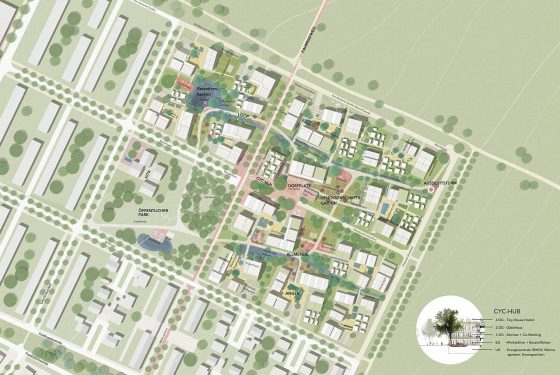 D - 30539 Hanover Kronsberg: adjacent to the Expo-Settlement Hanover-Kronsberg soll das „ecovillage Kronsberg“ entstehen. Träger ist die Genossenschaft ecovillage hannover eG, die 2019 gegründet wurde. Die Genossenschaft hat das 49.300 m² große Grundstück 2021 von der Stadt Hannover gekauft. Ab 5/2024 befindet sich die Genossenschaft in einem Insolvenzverfahren in Eigenverwaltung. Fertigstellung: ?
D - 30539 Hanover Kronsberg: adjacent to the Expo-Settlement Hanover-Kronsberg soll das „ecovillage Kronsberg“ entstehen. Träger ist die Genossenschaft ecovillage hannover eG, die 2019 gegründet wurde. Die Genossenschaft hat das 49.300 m² große Grundstück 2021 von der Stadt Hannover gekauft. Ab 5/2024 befindet sich die Genossenschaft in einem Insolvenzverfahren in Eigenverwaltung. Fertigstellung: ?
Show more >> – – – – – – – – – – – – – – – – – –
Möckernkiez eG Berlin
373 Car-free households (arithmetical) of 471 CU0.21 Car parking spaces / CU
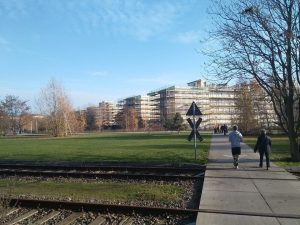 10965 Berlin: Cooperative for self-managed, social and ecological living eG. In the Möckernkiez model project, 471 residential units were created in 14 residential buildings. They were built according to the passive house standard and ecological building criteria. 0.21 parking spaces per unit. Property size: 30,000 m². It is barrier-free throughout and designed to be free of car traffic at the neighbourhood level. The Möckernkiez is located directly adjacent to the southeastern entrances of the Park am Gleisdreieck. Completion: 2018
10965 Berlin: Cooperative for self-managed, social and ecological living eG. In the Möckernkiez model project, 471 residential units were created in 14 residential buildings. They were built according to the passive house standard and ecological building criteria. 0.21 parking spaces per unit. Property size: 30,000 m². It is barrier-free throughout and designed to be free of car traffic at the neighbourhood level. The Möckernkiez is located directly adjacent to the southeastern entrances of the Park am Gleisdreieck. Completion: 2018
Show more >> – – – – – – – – – – – – – – – – – –
Lok.West" neighbourhood with power-to-gas technology in Esslingen
359 Car-free households (arithmetical) of 550 CU0.35 Car parking spaces / CU
![]() 73728 Esslingen Neue Weststadt: A "showcase quarter" with 600 apartments, office and commercial space as well as a new building for the Esslingen University of Applied Sciences is being built on 12 hectares. The total investment volume is around 190 million euros. 30 percent of the quarter's use is intended for commercial purposes. Construction of individual building blocks already started in 2016 and will continue until around 2022. Planned completion: 2022
73728 Esslingen Neue Weststadt: A "showcase quarter" with 600 apartments, office and commercial space as well as a new building for the Esslingen University of Applied Sciences is being built on 12 hectares. The total investment volume is around 190 million euros. 30 percent of the quarter's use is intended for commercial purposes. Construction of individual building blocks already started in 2016 and will continue until around 2022. Planned completion: 2022
Show more >> – – – – – – – – – – – – – – – – – –
Signal box 60 Cologne-Nippes
340 Car-free households (arithmetical) of 460 CU0.38 Car parking spaces / CU
 50733 Cologne-Nippes: "Car-free settlement". 460 apartments for approx. 1,500 residents. The parking space ratio is 0.2 cars per residential unit. A multi-storey car park with 120 parking spaces was built on the edge of the estate for the estate's households and for around 40 visitors. Normally, approx. 400 to 500 parking spaces would have been required at this location. Completion: 2013
50733 Cologne-Nippes: "Car-free settlement". 460 apartments for approx. 1,500 residents. The parking space ratio is 0.2 cars per residential unit. A multi-storey car park with 120 parking spaces was built on the edge of the estate for the estate's households and for around 40 visitors. Normally, approx. 400 to 500 parking spaces would have been required at this location. Completion: 2013
Show more >> – – – – – – – – – – – – – – – – – –
Westend Berlin-Charlottenburg
332 Car-free households (arithmetic) of CU6650.5 Car parking spaces / CU
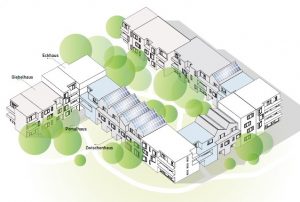
![]() D - 14055 Berlin-Charlottenburg: 665 units as a new housing estate with two-, three- and four-room apartments. Furthermore, single-family homes, shops, medical practices and a daycare center. Mixture of rental and owner-occupied apartments.
D - 14055 Berlin-Charlottenburg: 665 units as a new housing estate with two-, three- and four-room apartments. Furthermore, single-family homes, shops, medical practices and a daycare center. Mixture of rental and owner-occupied apartments.
On 3/14/2018, after 5 years of negotiations, the contract was signed. The company expects construction to start at the end of 2019, and the last construction phase could be completed in 2025.
Low-energy house standard, CHP, photovoltaic system, sustainable mobility concept with bicycle parking in front of the front doors and e-bikes, electric cars in the car-sharing fleet. Quarter with Cradle to Cradle certification and healthy building materials, green roof.
Show more >> – – – – – – – – – – – – – – – – – –
Student dormitory "Neue Burse" in Wuppertal
253 Car-free households (arithmetical) of 323 CU0.22 Car parking spaces / CU
The architects have created new, liveable living space from a building that was ready for demolition. Through the extension, the 629 individual residential units were adapted to a contemporary standard, in which the rooms were enlarged from 12 m² to 20 m² and equipped with their own bathroom and kitchen. In the course of the modernization, the old facade was removed. The new highly thermally insulated façade in timber construction was moved two metres outwards on its own foundations. Completion: 2003
Show more >> – – – – – – – – – – – – – – – – – –
Climate and timber construction quarter "Ellener Hof
250 Car-free households (arithmetical) of 500 CU0.5 Car parking spaces / CU
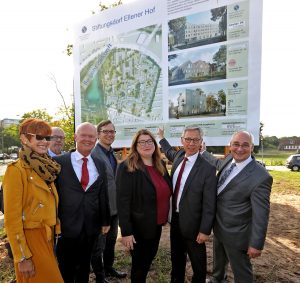
![]() D - 28329 Bremen-Osterholz: At least 500 apartments are planned, which will offer a new home to around 1,000 Bremen residents of all ages and from different social classes and cultures. In close cooperation with the Free Hanseatic City of Bremen, the Bremer Heimstiftung, as the owner of the site, is therefore not only working on new living space. Social institutions, clubs and cultural institutions will also enrich the "Ellener Hof Foundation Village" in the future. In addition, the partners are focusing on attractive green spaces. The respectful treatment of the valuable stock of trees, bushes and vegetation on the property is the basis and an integral part of all planning. Construction began on 7.9.2018. Planned completion: 2025(?)
D - 28329 Bremen-Osterholz: At least 500 apartments are planned, which will offer a new home to around 1,000 Bremen residents of all ages and from different social classes and cultures. In close cooperation with the Free Hanseatic City of Bremen, the Bremer Heimstiftung, as the owner of the site, is therefore not only working on new living space. Social institutions, clubs and cultural institutions will also enrich the "Ellener Hof Foundation Village" in the future. In addition, the partners are focusing on attractive green spaces. The respectful treatment of the valuable stock of trees, bushes and vegetation on the property is the basis and an integral part of all planning. Construction began on 7.9.2018. Planned completion: 2025(?)
Show more >> – – – – – – – – – – – – – – – – – –
Model project car-free living Bremen-Hollerland
160 Car-free households (arithmetical) of 200 CU0.2 Car parking spaces / CU
28357 Bremen-Hollerland: 200 WE (not realised); model photos, well analysed study on the failure of the project. The most important reasons: "too sterile architecture; too expensive although low-cost construction was promised; too far outside the city; that the light rail was not led into the new district; overall poor construction activity; large employer in Bremen went bankrupt. The Hollerland project, however, caused a lot of media hype and is considered a model for many other projects that have been realized in the meantime, such as "Bremen-Grünenstrasse", however, not on the outskirts but in the city center.
Show more >> – – – – – – – – – – – – – – – – – –
Car-free settlement Saarlandstraße
143 Car-free households (arithmetic) of CU1700.15 Car parking spaces / CU
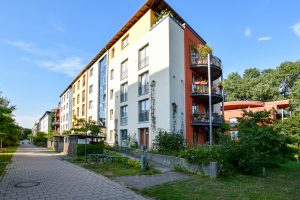 22303 Hamburg-Barmbek: 170 units, one of the largest car-free housing estates in Germany, parking space key 0.15 PkWs/WE. Completion: 1997
22303 Hamburg-Barmbek: 170 units, one of the largest car-free housing estates in Germany, parking space key 0.15 PkWs/WE. Completion: 1997
Show more >> – – – – – – – – – – – – – – – – – –
Student dormitory as mound houses
126 Car-free households (arithmetic) of CU1580.2 Car parking spaces / CU
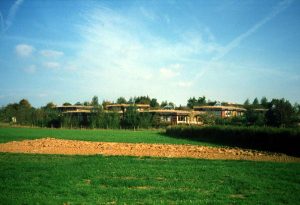 70599 Stuttgart-Hohenheim: Planning: H. Schmitges, N. Kaiser, G. Minke, 3-4 storeys, 158 flatshare rooms in 6 houses, ventilation heat recovery, wall radiation heating, occupation: 1983
70599 Stuttgart-Hohenheim: Planning: H. Schmitges, N. Kaiser, G. Minke, 3-4 storeys, 158 flatshare rooms in 6 houses, ventilation heat recovery, wall radiation heating, occupation: 1983
Show more >> – – – – – – – – – – – – – – – – – –
Old foundry, Winterthur
124 Car-free households (arithmetic) of CU1550.2 Car parking spaces / CU
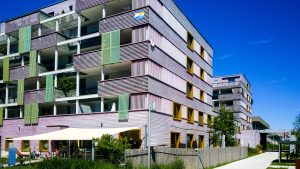 CH - Winterthur: Das Mehrgenerationenhaus Giesserei liegt in Oberwinterthur, im Stadtzentrum Neuhegi unmittelbar am Eulachpark. Es verfügt über 155 Wohnungen und 14 Gewerbebetriebe. Die Gebäude sind in ökologischer Holzbauweise erstellt und erfüllen den Minergie-P-Eco-Standard. Die Giesserei gilt mit nur 0,2 Parkplätzen pro Wohnung und 480 Veloständern als autofreie Siedlung. Grundstücksfläche: 11 000 m². Fertigstellung: 2013
CH - Winterthur: Das Mehrgenerationenhaus Giesserei liegt in Oberwinterthur, im Stadtzentrum Neuhegi unmittelbar am Eulachpark. Es verfügt über 155 Wohnungen und 14 Gewerbebetriebe. Die Gebäude sind in ökologischer Holzbauweise erstellt und erfüllen den Minergie-P-Eco-Standard. Die Giesserei gilt mit nur 0,2 Parkplätzen pro Wohnung und 480 Veloständern als autofreie Siedlung. Grundstücksfläche: 11 000 m². Fertigstellung: 2013
Show more >> – – – – – – – – – – – – – – – – – –
Design study "Car-free solar settlement Nancystrasse
114 Car-free households (arithmetical) of 140 CU0.2 Car parking spaces / CU
 76187 Karlsruhe-Nordweststadt: the design was planned for an undeveloped plot of land as a student research project at the University of Karlsruhe in cooperation with the association ASKA e.V., but was not realized. Concept: 140 units, photovoltaic and biomass CHP, business and office facilities, community facilities, gastronomy, car sharing tower, reed sewage treatment plant, board stack wood construction, hemp, flax or cellulose insulation, social settlement concept, integrated living. Completion: not realized
76187 Karlsruhe-Nordweststadt: the design was planned for an undeveloped plot of land as a student research project at the University of Karlsruhe in cooperation with the association ASKA e.V., but was not realized. Concept: 140 units, photovoltaic and biomass CHP, business and office facilities, community facilities, gastronomy, car sharing tower, reed sewage treatment plant, board stack wood construction, hemp, flax or cellulose insulation, social settlement concept, integrated living. Completion: not realized
Show more >> – – – – – – – – – – – – – – – – – –
Gartenhofsiedlung Weißenburg
110 Car-free households (arithmetical) of 138 CU0.2 Car parking spaces / CU
 48143 Münster: Car-free NRW model housing estate "Gartenhofsiedlung Weißenburg", Europe-wide competition, car-reduced mobility concept with 0.2 parking spaces per dwelling, 189 dwellings on 3.8 ha site area. Completion: 2003, completion of 2nd construction phase (4 buildings with 51 flats): 2019
48143 Münster: Car-free NRW model housing estate "Gartenhofsiedlung Weißenburg", Europe-wide competition, car-reduced mobility concept with 0.2 parking spaces per dwelling, 189 dwellings on 3.8 ha site area. Completion: 2003, completion of 2nd construction phase (4 buildings with 51 flats): 2019
Show more >> – – – – – – – – – – – – – – – – – –
Lower Neustadt Kassel
58 Car-free households (arithmetic) of CU870.1 Car parking spaces / CU
 34123 Kassel-Unterneustadt: Re-foundation of the Unterneustadt district. High building density with GFZ 2.0. Size: 29 buildings with a total of 87 WEs. Of which 73 are publicly subsidised and 65 WEs with a parking space number of 0.1 PkWs/WE. Completion: 2001
34123 Kassel-Unterneustadt: Re-foundation of the Unterneustadt district. High building density with GFZ 2.0. Size: 29 buildings with a total of 87 WEs. Of which 73 are publicly subsidised and 65 WEs with a parking space number of 0.1 PkWs/WE. Completion: 2001
Show more >> – – – – – – – – – – – – – – – – – –
Bike City" residential development in Vienna
56 Car-free households (arithmetical) of 99 CU0.7 Car parking spaces / CU
 AT - 1020 Vienna: 99 apartments, gross floor area 14,500 m2, initiated by Christoph Chorherr, developed by GESIBA, architecture: königlarch, open space planning: rajek barosch landschaftsarchitektur. Completion: 2008
AT - 1020 Vienna: 99 apartments, gross floor area 14,500 m2, initiated by Christoph Chorherr, developed by GESIBA, architecture: königlarch, open space planning: rajek barosch landschaftsarchitektur. Completion: 2008
Show more >> – – – – – – – – – – – – – – – – – –
Climate protection settlement "Am Kornweg
48 Car-free households (arithmetic) of 60 CU0.2 Car parking spaces / CU
 22769 Hamburg-Klein Borstel: 60 residential units, usable floor space 2,820 m2, approx. 160 inhabitants, car-free settlement with food co-op, bicycle fleet, bicycle city and car sharing. Number of parking spaces: 0.2 cars/WE. Planning: NeuStadtArchitekten (Hamburg). Completion date: 2008
22769 Hamburg-Klein Borstel: 60 residential units, usable floor space 2,820 m2, approx. 160 inhabitants, car-free settlement with food co-op, bicycle fleet, bicycle city and car sharing. Number of parking spaces: 0.2 cars/WE. Planning: NeuStadtArchitekten (Hamburg). Completion date: 2008
Show more >> – – – – – – – – – – – – – – – – – –
Anders Wohnen eG Bremen
23 Car-free households (arithmetical) of 23 CU0.22 Car parking spaces / CU
 28199 Bremen-Alte Neustadt: Architecture: Joachim Reinig (Hamburg), 23 flats, no parking spaces, common rooms, flexible floor plans, barrier-free development concept, wheelchair accessible flats on the ground floor, completion: 1995
28199 Bremen-Alte Neustadt: Architecture: Joachim Reinig (Hamburg), 23 flats, no parking spaces, common rooms, flexible floor plans, barrier-free development concept, wheelchair accessible flats on the ground floor, completion: 1995
Show more >> – – – – – – – – – – – – – – – – – –
Women's housing and building cooperative
20 Car-free households (arithmetical) of 49 CU0.59 Car parking spaces / CU
81829 Munich-Riem: 49 apartments, common rooms as well as a commercial unit, ultra-low energy house with passive house standard, controlled living space ventilation, barrier-free planning
Show more >> – – – – – – – – – – – – – – – – – –
ESA student dormitory Kaiserslautern
18 Car-free households (arithmetical) of 20 CU0.1 Car parking spaces / CU
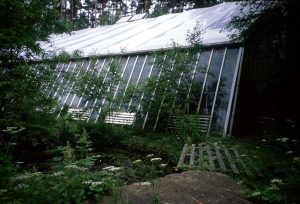 67659 Kaiserslautern: ESA (Energy Saving Student Residence): planned and built with students, "house in a house" principle (based on Bengt Warn's "Naturhuset"), 20 rooms, a kitchen and other common rooms, varied planting of the winter garden, recycled building materials, solar system for hot water, each room also has a private terrace or seating area in the greenhouse.
67659 Kaiserslautern: ESA (Energy Saving Student Residence): planned and built with students, "house in a house" principle (based on Bengt Warn's "Naturhuset"), 20 rooms, a kitchen and other common rooms, varied planting of the winter garden, recycled building materials, solar system for hot water, each room also has a private terrace or seating area in the greenhouse.
Show more >> – – – – – – – – – – – – – – – – – –
Multigenerational housing project Amaryllis eG
16 Car-free households (arithmetical) of 32 CU0.5 Car parking spaces / CU
 53229 Bonn Vilich-Müldorf: 32 units, multi-generation residential project, number of parking spaces 0.5 PkWs/WE, completion: 2008
53229 Bonn Vilich-Müldorf: 32 units, multi-generation residential project, number of parking spaces 0.5 PkWs/WE, completion: 2008
Show more >> – – – – – – – – – – – – – – – – – –
WEG "Am Rundling
15 Car-free households (arithmetical) of 22 CU0.3 Car parking spaces / CU
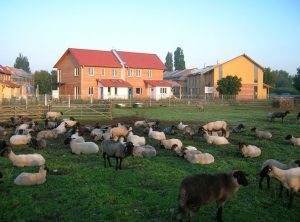 12487 Berlin-Johannisthal: 20 houses with 22 residential units (KfW 40-60) for 70 small and large people, ecological housing project. Number of parking spaces: 0.3 PkWs/WE, 100 m² solar collectors (50 kW), 23 kW photovoltaic system, 99 kW wood pellet system (with exhaust gas heat exchanger, downstream flue gas scrubber and condensate heat exchanger), 600 m³ grey water system, completion: 2007
12487 Berlin-Johannisthal: 20 houses with 22 residential units (KfW 40-60) for 70 small and large people, ecological housing project. Number of parking spaces: 0.3 PkWs/WE, 100 m² solar collectors (50 kW), 23 kW photovoltaic system, 99 kW wood pellet system (with exhaust gas heat exchanger, downstream flue gas scrubber and condensate heat exchanger), 600 m³ grey water system, completion: 2007
Show more >> – – – – – – – – – – – – – – – – – –
This overview can be accessed directly via the following URLS:
Domains
www.autofreie-quartiere.de
www.carfree-quarters.eu (English)
Subdomains
www.autofreie.quartiere.net
www.autofreie.siedlungen.eu
www.fahrradfreundliche.siedlungen.eu

